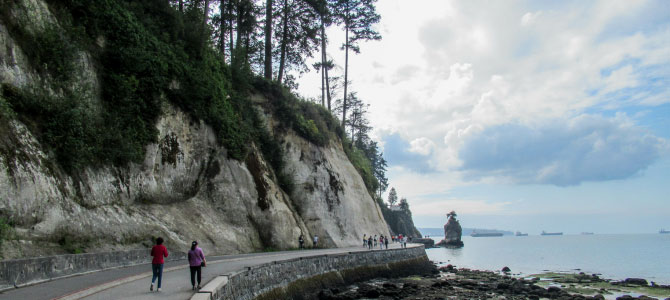
 Seawall at Third Beach to close in November for removal of hazardous trees and slope safety work
Seawall at Third Beach to close in November for removal of hazardous trees and slope safety work
Visitors to Stanley Park are advised that from November 4 to December 6, the seawall between Third Beach and Prospect Point will be closed to accommodate the removal of dead trees impacted by the hemlock looper moth.
A helicopter will be deployed periodically between November 14 and December 7 to safely remove and transport the felled wood from the cliffs above the seawall. The helicopter will be in use during daylight hours between 8am and 5pm, in accordance with the City’s noise control by-law.
Due to the risks of removing these logs on high slopes, and to ensure the safety of crews and park visitors, the seawall between Third Beach and Prospect Point will be closed for the duration of this work. The parking lot at Prospect Point cafe will also be closed, while Stanley Park Drive from the Causeway off-ramp to Prospect Point picnic lot will be subject to periodic 15-minute closures.
Slope stabilization and maintenance
Concurrently, throughout the month of November, Park Board crews will conduct their annual work to stabilize and maintain the slope near Siwash Rock.
Undertaking these necessary repairs in conjunction with this critical tree removal work will help minimize the impact to park visitors and reduce the chances of needing to close this section of the seawall at a later date.
Crews will remove unstable material from the slopes and ensure that rock slabs are securely connected to the main rock wall to minimize the impact of additional loads on the slopes.
Temporary detours will be in place for those looking to bike, walk or roll the seawall during the closure period.
Please visit bit.ly/3A5MtSE External website, opens in new tab or follow on-site signage for more information.
Further information will be shared via Park Board channels.
Protecting Stanley Park
In October, the Park Board approved plans to undertake risk mitigation work related to the impacts from the hemlock looper moth in Stanley Park. The hemlock looper insect experiences population outbreaks roughly every 15 years, however the most recent outbreak resulted in significant tree mortality in the park causing an elevated risk to public safety.
Phase II work started in mid-October and will finish in early 2025, followed by replanting in spring 2025. Tree work will concentrate on areas heavily used by the public adjacent to the Aquarium, Brockton Point, Chickadee Trail and along the northwest seawall.
More information on the hemlock looper moth infestation in Stanley Park and updates on the progress of Phase II work can be found at www.vancouver.ca/stanley-park-trees.